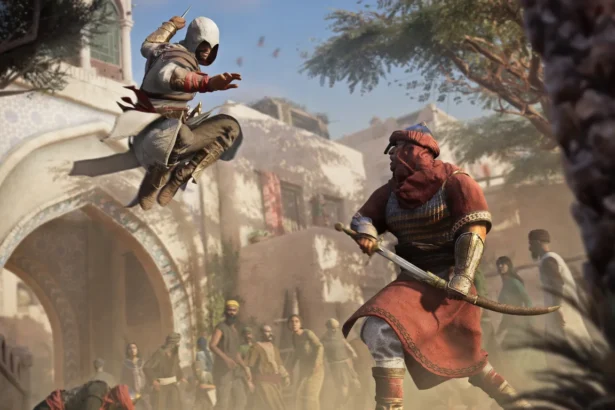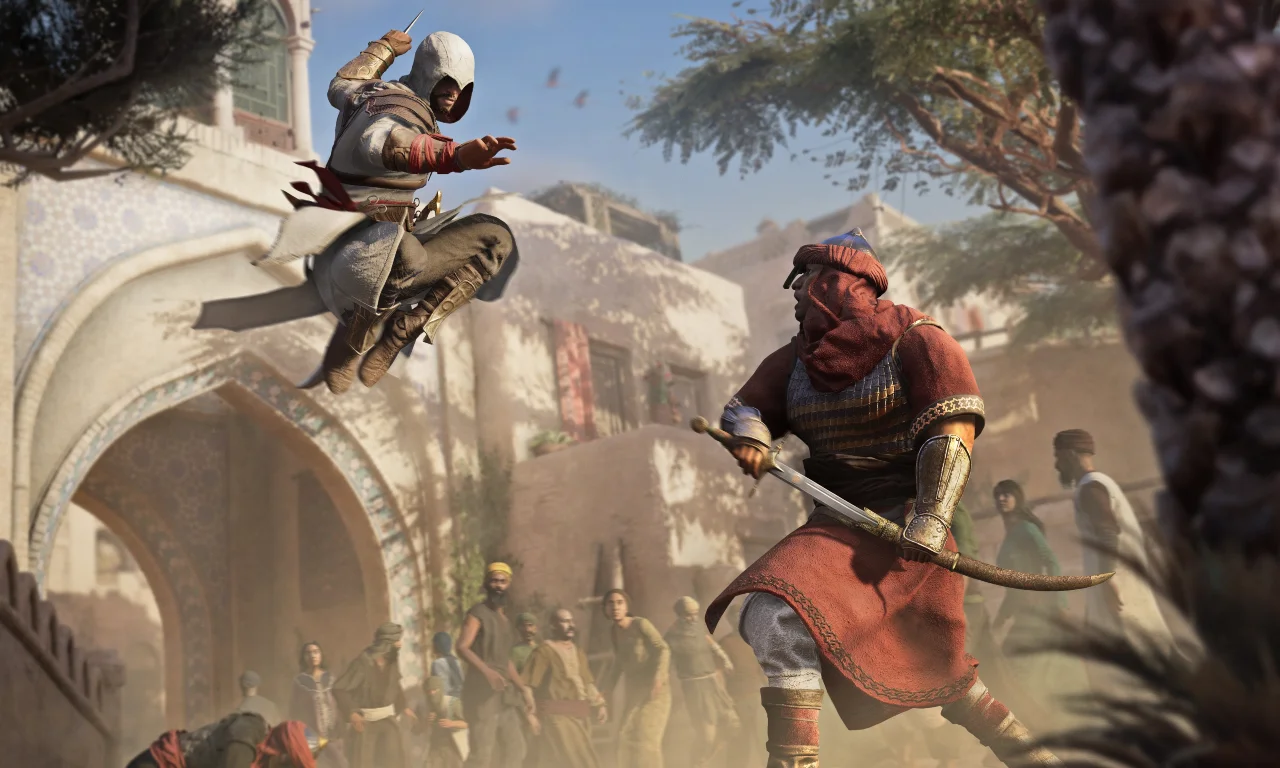Every once in a while, a game creeps out of the ether that is not so much appealing to your taste as lovingly crafted with an almost eerie prescience regarding what you want from games. This is the aura in which I found myself as carefully went through the beautiful, ancient streets of Baghdad — an enormous and thriving city brought to life in Assassin’s Creed Mirage. What began as a simple add-on for the already gigantic Assassin’s Creed: Valhalla, Mirage quickly grew into an excellent standalone title that felt reminiscent of the classic stealth-based days one would remember from Ubisoft giant where tactics and slick brutality were more prominently featured than trudging through levels on the never-ending grind. It was a transition that felt more emotional; as though the developers had gone on a silent retreat or pilgrimage, to reflect and remember what Assassin’s Creed meant to us all.
Playing Assassin’s Creed Mirage kinda feels like rekindling an old flame with this high school sweetheart. It’s the charm you know and love, but with the bittersweet touch of a painful realization that everything we love is just not all hearts and rainbows like our rose-tinted nostalgia glasses led us to believe. Still, despite the odd trip or stumble in its stride, Assassin’s Creed Mirage successfully rekindles that old flame; a peek at what could be coming down the line as a series of games continues to go back to basics. To a long-term player who has seen the faltering (and potential redemption) of this series over so many entries, Mirage represents more than just an entry in itself — it is that most feathery touch of hope to any fan wondering if he or she still knows what was fundamental when we first fell for AC.
Back to Basics
The moment I jumped into Assassin’s Creed Mirage, it felt as if history had thrown me back into Altair or Ezio ages. It was a taste of that fresh old air among the modern-day RPG-filled landscapes of Assassin’s Creed. Let the days when being an assassin mean skulking around unseen, scouting enemy group movements, and choreographing a wordless dance of death. Mirage brings back that spirit, dusts off the old stealth mechanics, and gives it a modern-day touch-up. It is almost as if Ubisoft suddenly recalled that the soul of Assassin’s Creed lay not in trading dialogue trees or stat-grinding but rather this — cold steel encountering hot flesh through a hidden blade. Ah, the good old days!
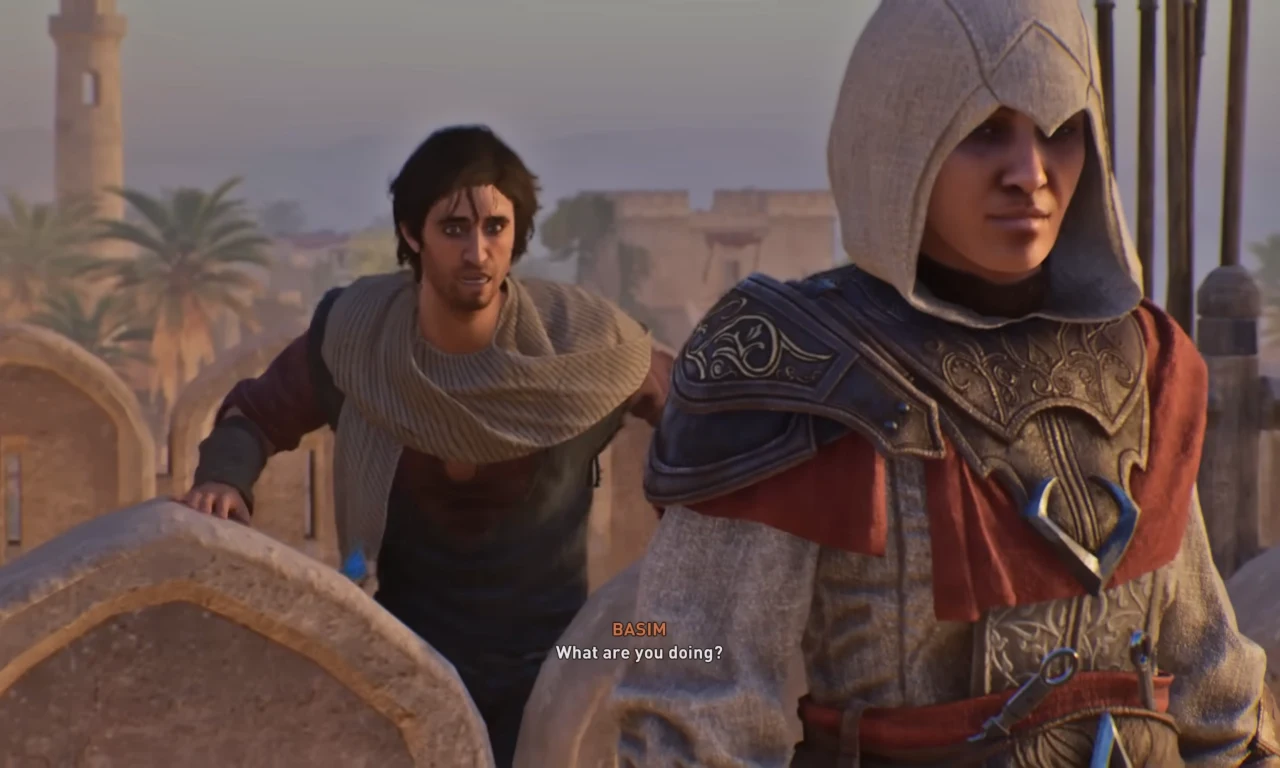
The transfer not only is a legacy move; the stealth in Mirage has further evolved, mixing that classic assassin feel with a bit of early 21st-century gaming pizzazz. The rooftops are brimming with archways that smile back at your boots, ziplines extend a cordial dare to the aerial express and you high-flying hay trolleys lowering their chests for just one more death-defying jump from on high. The city is a secret sandbox, lovingly pieced together to tease your methodical brain, daring you to choreograph that dance of death from within the darkness. Yet when the game drops you before a sharp ledge with a battalion of guard soldiers monitoring underneath unknowing of what havoc is about to be unleashed from above, it seems as if Ubisoft sourced our craziest assassin dreams. The success of a clean kill was good, but the recognition of not just unseen, oncoming dread in surprise had brought so much more thrill than expected into my being.
But as you tread the fine line between darkness and light, often in your present-day surreal world, then there are a few things that come across to spoil some more broth. The combat, unfortunately never rises above the level of endless top-to-bottom spam-fests that we envisioned our beautiful dance of death would be much closer to achieving. Character mobility was sometimes mired in what felt like a hundred kilometers of syrup, and the parkour — even when it looked great — wasn’t always so hot flowing from animation to gameplay. This is like taking a sip of your favorite vintage wine, only to realize there’s an aftertaste of modern-day preservatives.
That said, Mirage is happy to indulge its heritage in these less important ways. And doing so by wearing a modern cloak that still tips its hat to the classic days of AC. The merge is not perfect but the throwback heartbeats are there to be felt. Each jump, each stealth kill, and every close shave was a constant reminder of why I loved the franchise in the first place. This is Ubisoft returning to its roots, giving a small dollop of what made the series great before coating it in some gaming present bling. While the sun began to set, casting impressive silhouettes over just how gorgeous Mirage could look in full swing—with myself hiding somewhere within which ready for an assassination—it became clear: Assassin’s Creed Mirage was a love letter to its lineage of stealthiness, a gentle declaration that yes maybe this time things had all worked out as they once did.
Ubisoft Bordeaux’s Spin
Stepping onto the grand stage with a lead project is no small feat, especially when it’s under the big banner of Assassin’s Creed. Yet, Ubisoft Bordeaux took the helm with Assassin’s Creed Mirage, and did they take us on a trip down memory lane albeit with a fresh spin? Up until Mirage, Bordeaux was like that backstage maestro, assisting in managing the grandeur of major AC titles and contributing to Valhalla’s DLC. But with Mirage, they stepped into the limelight, and the gaming arena held its breath.
The question buzzing in every franchise lover’s mind was, “In a series that fluctuates throughout the course of time like a chameleon, what does the term “classic” actually imply?” You may think about the idealized secrecy and chain-killing sprees of the Ezio time define the traditional Assassin’s Creed atmosphere, or your mind might glow with the thought of the high-seas adventures or assembling an assassins’ fraternity. It’s like every title in the series added a new flavor, but Bordeaux decided to take a scoop from the original dish. They aimed their crossbow at the first Assassin’s Creed game, the one that started it all, to find their north star. It’s a character that shines brightly over 9th-century Baghdad, bringing us many years into Altar’s past to investigate the Basim Ibn Ishaq’s roots, a name that rings bells from Valhalla.
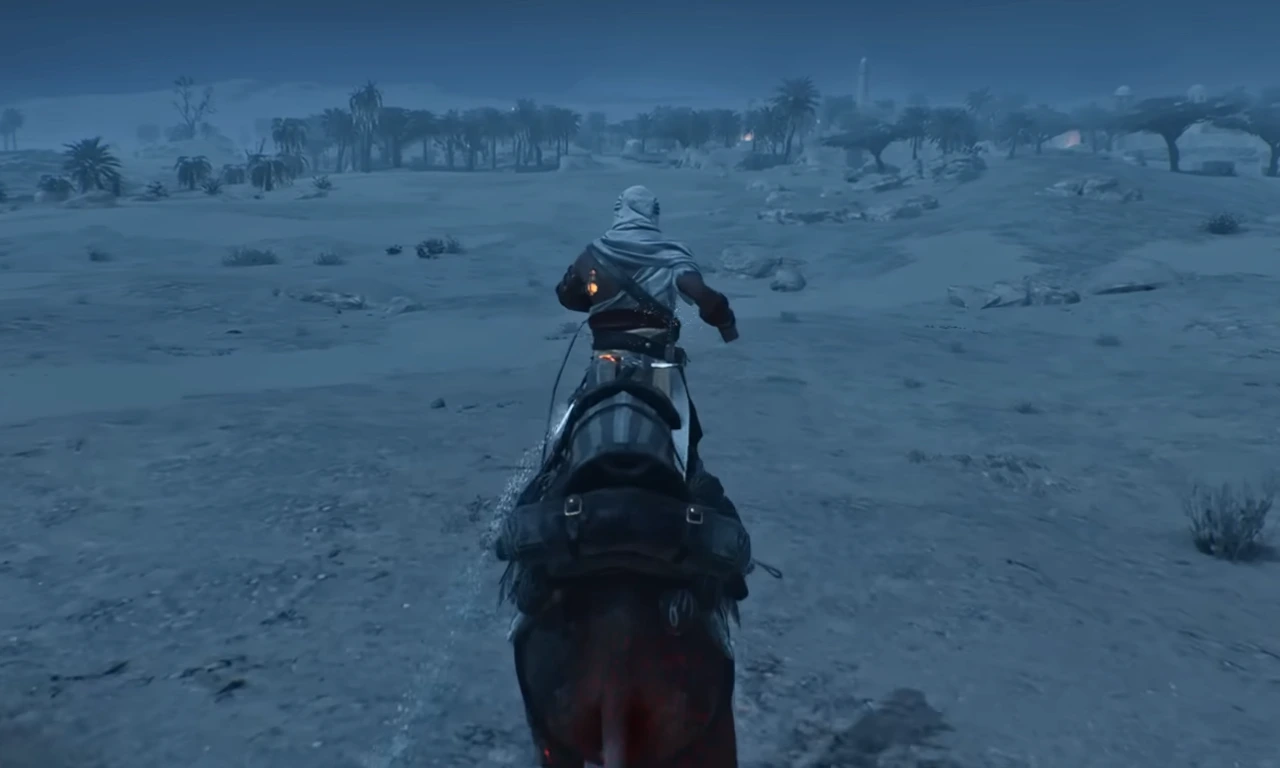
And there is the brilliance of combining old-school vibes with modern stealth mechanics. Mirage takes the raw essence of social stealth from the series’ infancy and includes a sprinkle of modern-day-level design magic. Each task seems like an arena for disguise, complete with many paths and enemy patrols that may be eliminated, sidestepped, or just left clueless.
Furthermore, with the inclusion of a nice eagle-eye view, scouting from the skies before getting into the stealthy mayhem is a nod to the modern gaming era, while still keeping the series true intact. A sneaky raid plotting experience in an Assassin’s Creed title wasn’t previously so pleasant. The arsenal at your disposal isn’t just a one-note killfest; you’ve got your great swords, smoke explosives, sleep needles, and more, making the stealth approach a cerebral endeavor rather than a button-mashing race to the assassination target. But the tale felt a bit of an expansion trying to wear the big boots of a standalone title, especially with the story being tightly knit with Valhalla’s lore. It’s a peculiar blend of the old and new, giving a taste of both worlds yet leaving a craving for a bit more coherence.
Ubisoft Bordeaux has designed something nostalgic yet fresh, familiar yet new. It’s a delicate dance between honoring the series’ legacy and injecting current-gen game design sensibilities. And as the credits rolled, it was clear, that the Bordeaux touch added a new layer to the AC saga, one that beckoned the old guard of the franchise while extending a hand to the new. It’s a step that hints at the thrilling possibilities of what the “classic” vibe could bring to the future chapters of Assassin’s Creed.
Stealth Mechanics
How we’ve longed for the days when stalking from the shadows is an art form. Assassin’s Creed Mirage seems to have heard our stealthy cries and served up a platter of sneakiness that had us drooling. Imagine that you’re perched on a rooftop, the moon casting long, eerie shadows on the cobblestone below, and the only sound is the distant laughter from a tavern and the occasional clank of guards’ armor. You survey the area, spotting guards patrolling in a pattern that you can almost dance to. Your fingers itch over the controller as you plan your silent, deadly ballet. The game taps into the primal stealth, making every mission a puzzle waiting to be silently unraveled.
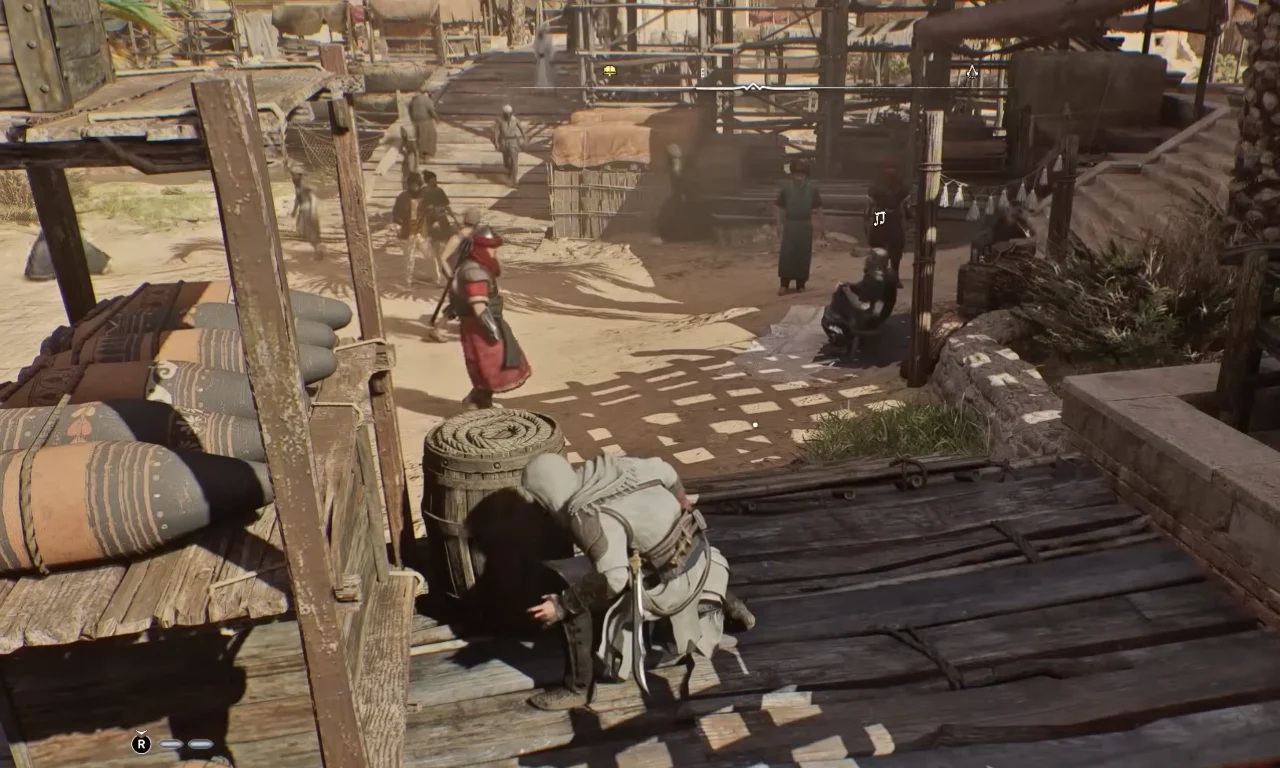
The game takes stealth and cranks it up to eleven with different ways to approach your objective. You can be the ghost, picking off guards with well-aimed sleep darts, or you can be the storm, sneaking through the shadows and leaving a trail of bodies as you carve your way to your target. The toolkit is huge and diverse, offering a suite of lethal and nonlethal possibilities. But you know how good it feels to hit a headshot sleep dart from the rooftop? Chef’s kiss!
Mirage also adds a modern touch with the “black box” quests where you kill an individual in relatively intricate, expertly designed assassination scenarios as seen in other popular games. It’s in these missions that you’ll enjoy multiple paths, disguises, and social stealth mechanics to allow you to creep up on your target before hitting them with something unpleasant. It is a tasteful blend of planning, patience, and execution that continues to keep you hungry.
In the end, we shouldn’t forget that the pesky snails are guarded by perhaps more annoying trees — guards. So, this release gives them a more responsive and unpredictable AI when things go south but links everything together. Trigger an alarm and you’ll catch them searching the bushes, redistributing patrol routes where you feel a robber lore game of hide-and-seek is going to add — but it is all in stealth. Moreover, there are social stealth mechanics in the game too for good measure. You can, for instance, create a diversion by disappearing in the crowd or hiring some pirates and even tossing a coin to the musician — just like you will use elements that make up your world to specialize. It paid tribute to everything that came before — every stealth tactic, in particular, felt like a nice nod back without it ever feeling regressive. In a lineup that has somewhat lost its sneaky edge of late, Mirage’s covet mechanics are one welcome whiff of stealthy facility. A back to basics, an audacious lullaby composed from the empty melodies of nights long gone, and a lesson in what it feels like when you stalk that shadowy blade.
Combat and Parkour
AC Mirage wanted to channel its inner combat memories too, reimagining the sword clashing of old alongside a dash of Valhalla group huddles. It’s the same sort of feel but a new coat of paint, you know your counter-kills and that ever-so-satisfying parry on Assassin’s Creed Mirage AND THE FINISHERS TO REMIND YOU WHY YOU FEAR THE CREED. At other times the combat looks stuck in limbo, between classic visceral choreographed kills and modern mushy brawlfests. Enemies can occasionally seem like they went to the school of ‘how not to respond when taking a slice’ and animations are too animatic at times… let’s say, strange. They also have this strange aura when they hit you as if they temporarily transform into disco warriors before coming after you. A long way from the cinematics of Brotherhood.
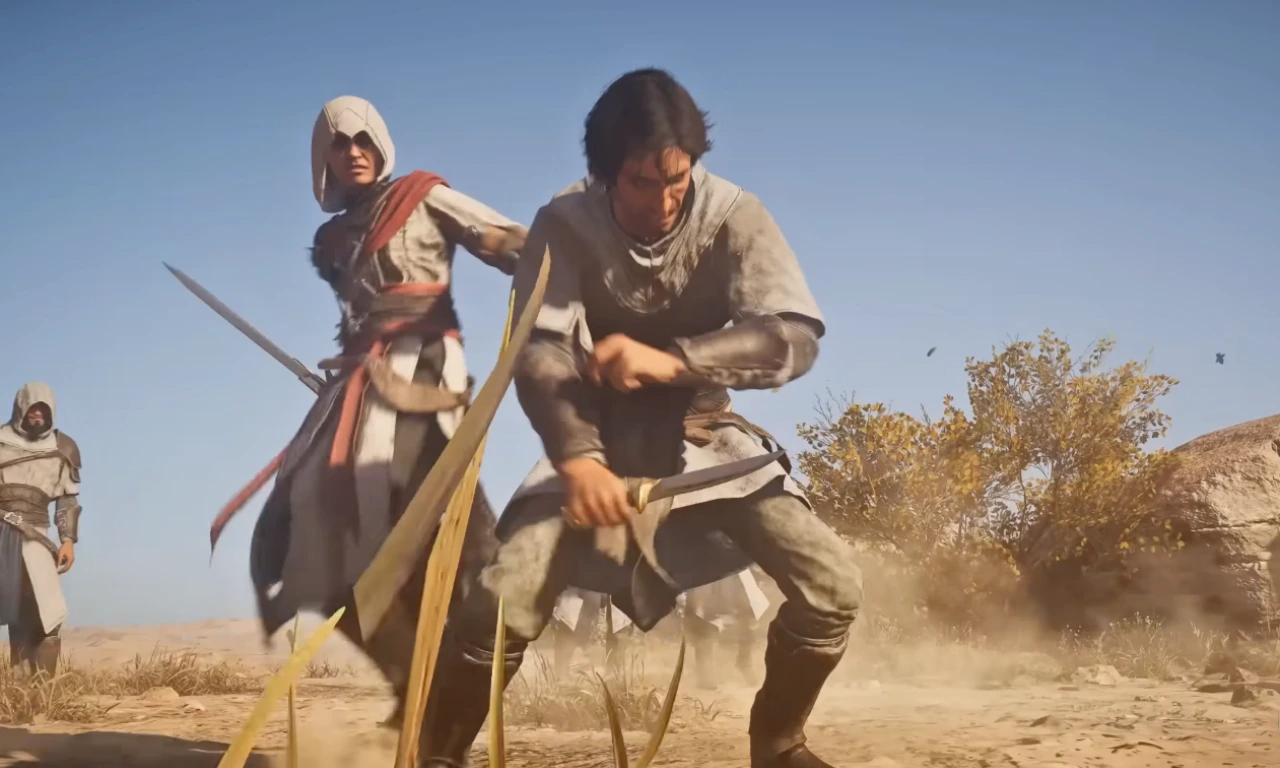
The ability to scale walls, leap across rooftops, and flow through the urban jungle has always been the series’ parkour’s crowning achievement. In Mirage, the parkour has seen some tweaks, some good, some that’ll make you facepalm. The animations are gorgeous, capturing the fluidity and grace of a master assassin in motion. The developers have tried to recapture the magic, and at times, it’s a sight to behold.
But then comes the ‘Oh come on!’ moments. You know, when Basim decides to do a phantom leap, defying your controls, and plunging into the abyss below. Or when he hesitates on the edge, contemplating the meaning of life before making a jump. And who could forget the ‘parkour down’ control from Unity? It’s missed, like an old friend who’d help you descend in style rather than plummeting like a rock. It’s a mix of poetic motion and sudden stumbles that can either leave you in awe or fits of rage. In AC Mirage, you will see a “go down” key sharing space with sneak mode, leading to a comedy of errors where you might find yourself crouching when you intend to descend, or vice versa. It’s like the game sometimes gets a bit too excited and forgets what you asked it to do.
Despite the issues, the true vibe of what makes Assassin’s Creed thrilling is there. The combat, with all its quirks, still has moments of brutal satisfaction, and the parkour, despite its occasional awkwardness, gives you a sense of freedom and fluidity. It’s a blend of nostalgic charm and brand-new mechanics, like an old tune with a modern beat. It’s clear that Mirage is a step, a leap, and a few sword swings toward recapturing the series’ famous days, with a few today’s lessons thrown into the mix.
The Beauty of Baghdad
Where do I even begin with the spectacle that is Baghdad in Assassin’s Creed Mirage? It’s like stepping into a meticulously crafted canvas where every stroke reveals the ancient charm and vibrancy of a bygone era. As I bounded across rooftops, the city below was a bustling tapestry of life, a blend of authentic architecture, vibrant marketplaces, and citizens going about their daily grind. It was like Ubisoft Bordeaux took a time machine back to 9th-century Baghdad, took notes, and then recreated it with a blend of love, artistry, and a sprinkle of modern gaming magic.
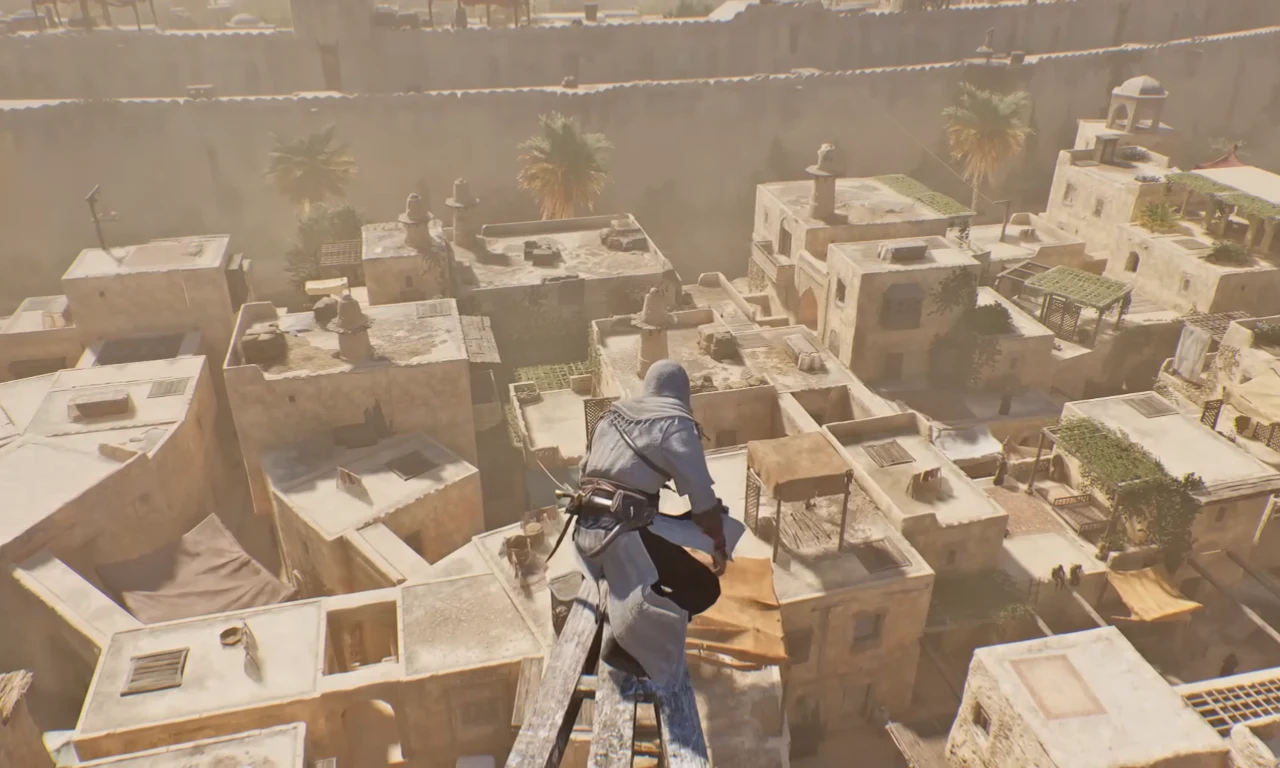
The level of detail is just… awesome. Buildings adorned with ornate designs, markets that are a riot of colors and textures, and talks that float around in Arabic, immersing you in a living, breathing slice of history. It’s more than just a backdrop; it’s a character in its own right, setting the stage for your stealthy escapades.
Furthermore, the “History of Baghdad” codex entries are the game’s way of inviting you on a historical adventure, offering nibbles of rich storyline and real historical tidbits as you parkour through the city. Each entry is a window into the past, a narrative intertwined with gameplay that makes exploring every nook and cranny of Baghdad an enlightening journey. I mean, who knew a game could make you a history buff overnight?
Narrative and Length
It starts with a healthy dose of mystery as we’re planted in the dainty boots of Basim Ibn Ishaq – probably not unfamiliar to anyone who’s roamed through Valhalla’s Viking lands. The story spins out in the beginning, conjuring a nasty djinn hovering over our assassin during nightmares, giving you an impulse to drive into unknown depths. Once you unsheathe your blade, though, it’s more like the game says ‘Oh right’ and lets you wade into stealthy ballet, but keeps story folks hungry.
Here, the core storyline is barely more than a string of perfunctory interrogations that, once resolved, leave you following clues to the doorstep of whichever Order members you want to locate. It’s all an interconnected series of deadly encounters, more than anything resembling a cohesive story. The hookups to Valhalla are everywhere, too – even if you’ve not sailed on that Viking adventure yet, it can all seem a little exclusive. Quite a mixed bag — if you’re the lore enthusiast who can make connections and nod to AC Valhalla, this all makes sense; but for those outside that circle, it sounds rather jarring.
Regarding the game’s length, after about 20 to 25 hours, the sands have run out of time — a mark that seems kind of short in this day and age when it comes to sprawling open-world sagas. Escaping the golden bars of Mirage’s dungeons always feels great, but while this majestic and often little-explored land begs for more content to fill its big length. It is a push and pull between wanting more stories in the baking lands of Baghdad versus valuing this tight narrative.
The great thing about it is the lack of bloat. Assassin’s Creed Mirage moves away from the open-world checklist mantra to offer a more focused, less cluttered escape something like an oddity in our current storm of open-world games. The game is a tale told in short stories of stealth and assassination. While likely not long enough to feed those hungry for marathon quests, a sprint through the game is well-packed with action and stealth gameplay blended together into its story — while providing some moments of intrigue and tying itself back somewhat chaotically to other parts in Assassin’s Creed lore. A return to roots is a lot of things; and this story flirts with the past as well as the present, offering up an espionage adventure that’s just as swift and precise as the assassin blade.
Final Verdict
Assassin’s Creed Mirage evokes all the nostalgia of the stealth-centric past that once crowned this series the king of shadows. It’s not all good killing times and a walk in the park, though… there are hiccups here that need to be addressed soon enough; save for this minor nitpick, it is quite annoying at certain points. The game compresses the expansive map, prunes down on the loot buffet, and reduces both combat width and the gear pool. And you know what? In a world where every open-world saga attempts to bloat with hours of playtime. Mirage is a compact, focused game that provides quick palate-cleansing stealth as opposed to wading through a massive swamp of side quests.
The plot is light on density, though, and the cast of characters here is not going to have you reminiscing any time soon. The ride is an easy one and clips along at a solid pace but without the dense narrative of some of its behemoth siblings. But the fast pace means you are never stuck waiting around or lost in story limbo. Also, the very heart of pearls is the city of Baghdad. It might not contain that one gorgeously wicked moment of awesomeness, but it is still an amazing masterpiece. The city is a faint whisper of history, every alley and hut tells its own tale, shadows that hide secrets. The attention to detail imbues every nook of this city is a story unto itself, an ode to yesteryear.
Mirage is a call to those who have taken leave of the Assassins, offering an opportunity to return as well as harking back with some old-fashioned elements for longtime players. So, do I recommend Assassin’s Creed Mirage? Oh, you bet. For those who’ve strayed from the faith, this is your call back to the shadows. Other open-world adventures are bludgeons by comparison but Mirage is a sleek assassin slipping through the shadows, perfecting its strike. It’s not on the monster scale of its predecessors, but Mirage stands tall with a small-focused sneaky heart that you might find to still be true at this early stage in Assassin’s Creed. A few glimmers of a return to the life they led and some brighter signs that all this will become just another entry in their list of adventures.

